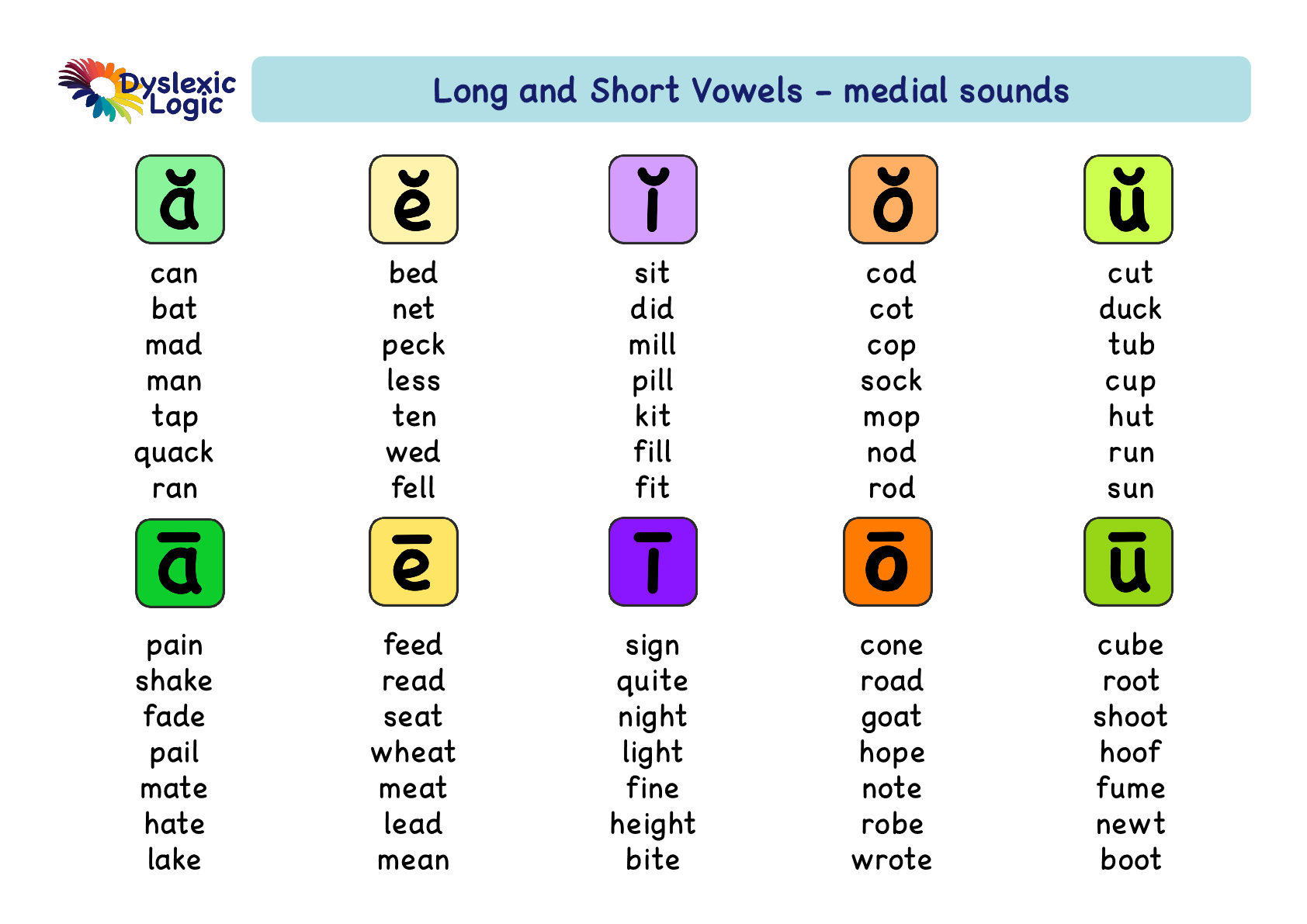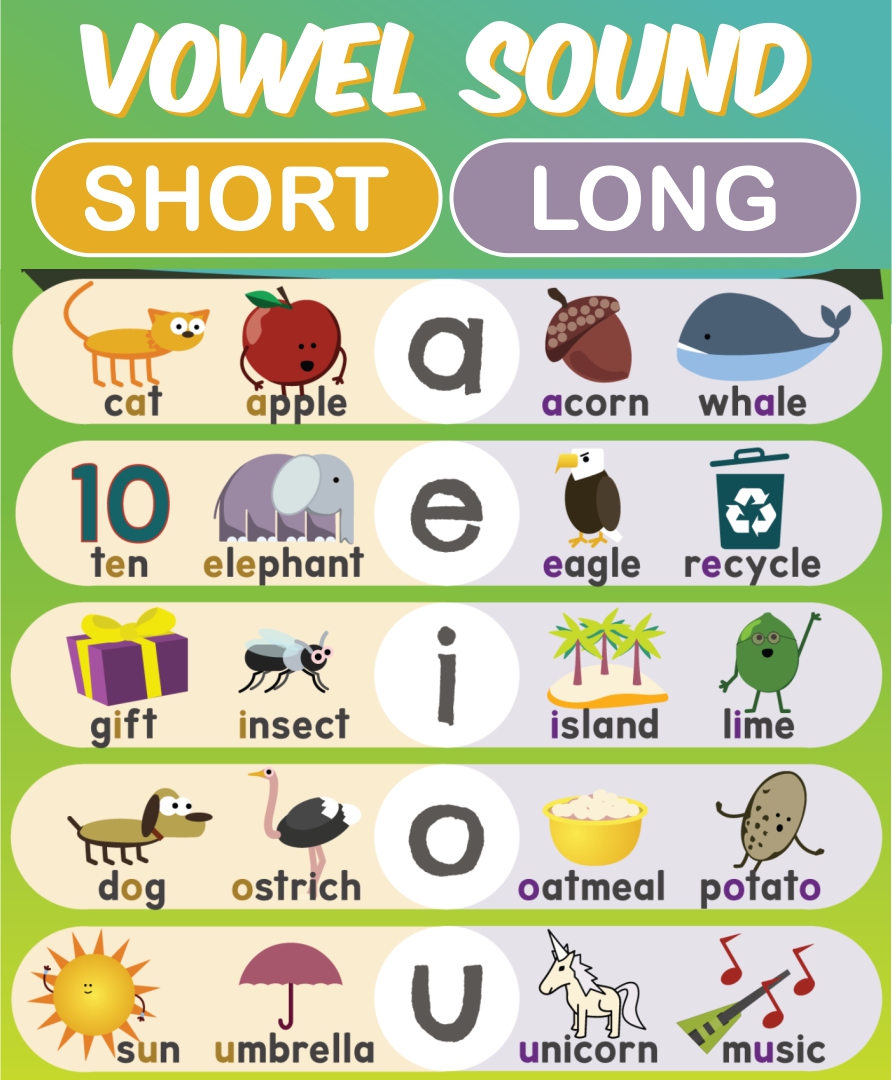Have you ever wondered why the “a” in “cat” sounds so different from the “a” in “cake”? It’s all about vowel sounds, and specifically, the fascinating difference between long and short vowels. Understanding this concept is crucial for both reading and writing, helping us decode words accurately and express ourselves effectively. This article serves as your comprehensive guide to long and short vowel sounds, complete with a downloadable PDF to help you master these essential building blocks of the English language.

Image: www.dyslexiclogic.com
The English alphabet has just five vowel letters: A, E, I, O, and U. However, these five vowels can be pronounced in a variety of ways, creating a much wider range of sounds. To simplify this, we categorize these sounds into two main groups: long vowels and short vowels. Long vowels typically have a drawn-out sound, similar to the way the letter is spelled. Short vowels, on the other hand, are pronounced quickly and are often represented by a single sound.
Demystifying Long and Short Vowel Sounds
Understanding Long Vowel Sounds
Long vowel sounds are often easier to conceptualize because they tend to resemble the sound of the letter itself. When a vowel is pronounced as a long vowel, it is typically held out for a longer duration. Here’s a breakdown of the long vowel sounds:
- Long A: Sounds like the “a” in “cake” or “name” (often represented by the letter “a” with a macron above it: ā).
- Long E: Sounds like the “e” in “see” or “bee” (often represented by the letter “e” with a macron above it: ē).
- Long I: Sounds like the “i” in “kite” or “time” (often represented by the letter “i” with a macron above it: ī).
- Long O: Sounds like the “o” in “go” or “no” (often represented by the letter “o” with a macron above it: ō).
- Long U: Sounds like the “u” in “cube” or “flute” (often represented by the letter “u” with a macron above it: ū).
Unveiling Short Vowel Sounds
Short vowels are pronounced quickly and often have a more compact sound compared to their long counterparts. It’s crucial to note that the pronunciation of short vowels can vary depending on the letter combinations and the word itself. Here’s a breakdown of the short vowel sounds:
- Short A: Sounds like the “a” in “cat” or “man” (usually represented by the letter “a” alone).
- Short E: Sounds like the “e” in “bed” or “pen” (usually represented by the letter “e” alone).
- Short I: Sounds like the “i” in “pig” or “trip” (usually represented by the letter “i” alone).
- Short O: Sounds like the “o” in “hot” or “dog” (usually represented by the letter “o” alone).
- Short U: Sounds like the “u” in “cup” or “sun” (usually represented by the letter “u” alone).

Image: mungfali.com
Decoding Vowel Sounds: The Key to Reading and Writing
The Importance of Phonetics
Understanding long and short vowels is crucial for mastering phonetics – the study of speech sounds. Phonetics helps us decipher the relationship between letters and their corresponding sounds, enabling us to accurately pronounce words and comprehend the written language. Mastering the concepts of long and short vowels is the foundation for decoding words and comprehending the spoken language.
The Role of Vowel Sounds in Spelling
Vowel sounds play a critical role in spelling. Different combinations of letters can create different sounds, especially in words with multiple vowels. Recognizing the long and short vowel sounds will help you understand why words are spelled the way they are and identify potential spelling errors.
Beyond the Basics: Vowel Digraphs and Other Combinations
While the long and short vowel sounds provide a basic framework for understanding vowel sounds, there are numerous other vowel combinations and digraphs (two letters that represent one sound) that can create unique vowel sounds. Examples of vowel digraphs include:
- “ai” as in “rain” (long a sound)
- “ea” as in “heat” (long e sound)
- “ie” as in “pie” (long i sound)
- “oa” as in “boat” (long o sound)
- “ue” as in “blue” (long u sound)
By understanding these combinations, you can unlock the full spectrum of vowel sounds in the English language.
Grasping the Concept with a Long and Short Vowel Sounds List PDF
The Power of Visual Aids
Learning about long and short vowels can be challenging, especially for young learners. A visual aid, such as a PDF, can significantly help to reinforce these concepts. A well-structured PDF will help you:
- Visualize: Visually represent each vowel sound with its corresponding pronunciation, often using simple images and graphics.
- Organize: Clearly categorize words with long and short vowel sounds, making it easier to differentiate between them.
- Practice: Include exercises and activities to help you apply your newfound knowledge of long and short vowels.
Download and Utilize Your Long and Short Vowel Sounds List PDF
To help you master these fundamental concepts, download our comprehensive Long and Short Vowel Sounds List PDF. This PDF includes:
- Clear definitions: Concise and simple definitions of long and short vowel sounds.
- Word lists: Organized word lists categorized by long and short vowel sounds.
- Visuals: Illustrations and diagrams to visually represent the vowel sounds.
- Practice exercises: Activities and games to reinforce your understanding of long and short vowels.
Long And Short Vowel Sounds List Pdf
Conclusion: Unlocking the World of Vowel Sounds
Long and short vowel sounds form the foundation of English pronunciation and spelling. By understanding these concepts and using resources such as our Long and Short Vowel Sounds List PDF, you can significantly enhance your reading and writing skills. The PDF serves as a valuable tool for learners of all levels, providing an easily accessible and engaging way to master vowel sounds and unlock the full potential of the English language. So, go ahead, download the PDF, and embark on your journey to mastering the fascinating world of vowel sounds!






